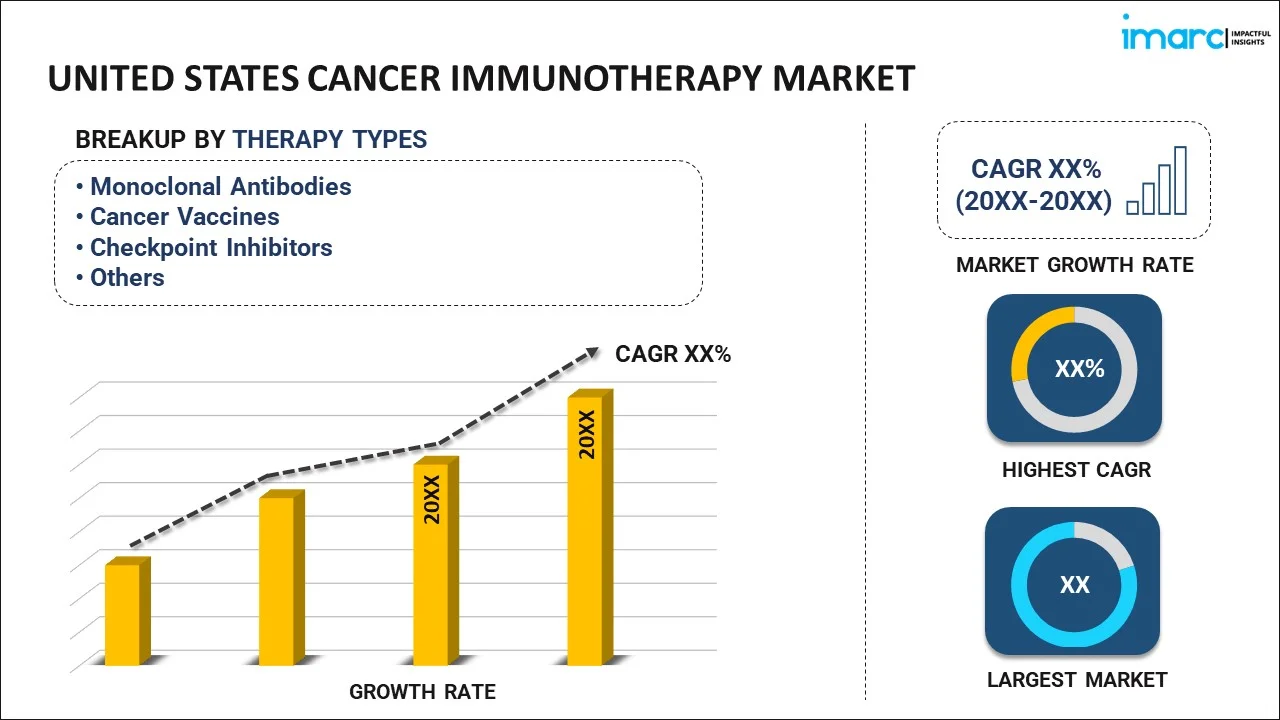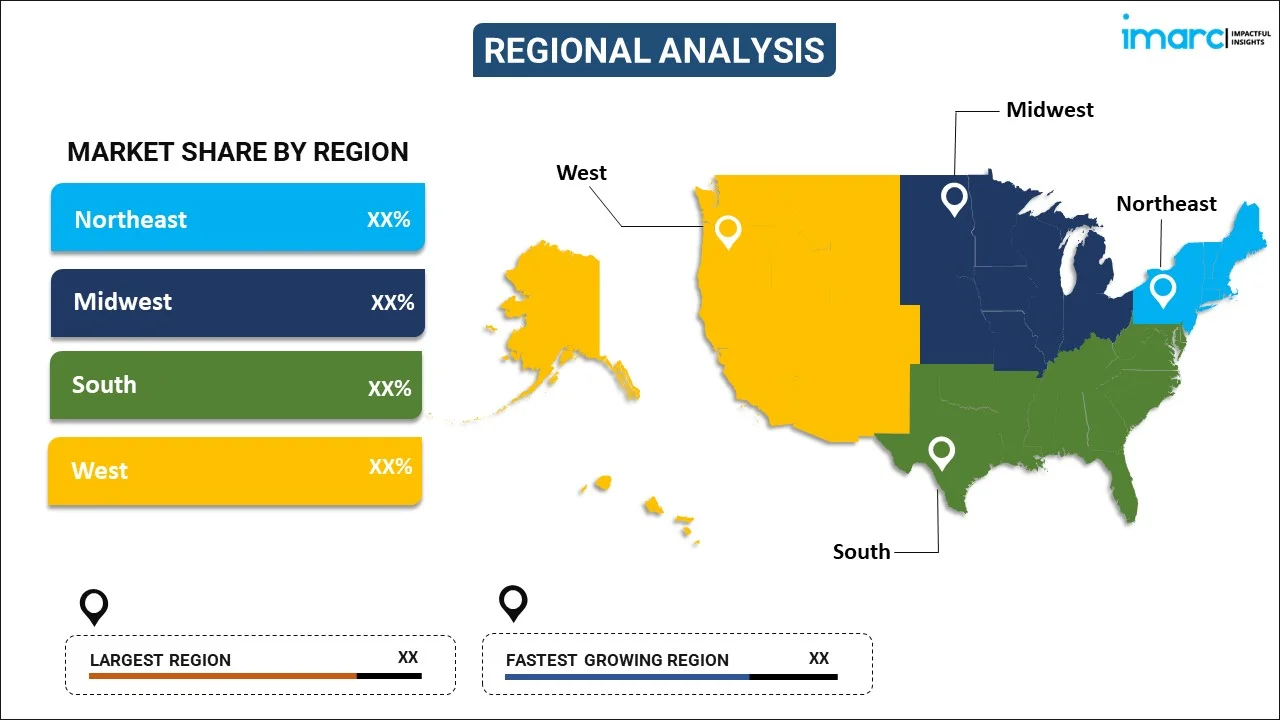
United States Cancer Immunotherapy Market Report by Therapy Type (Monoclonal Antibodies, Cancer Vaccines, Checkpoint Inhibitors, Immunomodulators, and Others), Application (Lung Cancer, Breast Cancer, Colorectal Cancer, Melanoma, Prostate Cancer, Head and Neck Cancer, and Others), End User (Hospitals, Cancer Research Centers, Clinics, and Others), and Region 2026-2034
Market Overview:
United States cancer immunotherapy market size reached USD 35,271.7 Million in 2025. Looking forward, IMARC Group expects the market to reach USD 82,067.9 Million by 2034, exhibiting a growth rate (CAGR) of 9.84% during 2026-2034. The continuous advancements in research and development (R&D), a rising incidence of cancer cases, substantial investments in healthcare infrastructure, favorable regulatory support, collaborations among industry stakeholders, and increasing awareness regarding personalized treatment are factors accelerating the market growth.
|
Report Attribute
|
Key Statistics
|
|---|---|
|
Base Year
|
2025 |
|
Forecast Years
|
2026-2034
|
|
Historical Years
|
2020-2025
|
| Market Size in 2025 | USD 35,271.7 Million |
| Market Forecast in 2034 | USD 82,067.9 Million |
| Market Growth Rate (2026-2034) | 9.84% |
Access the full market insights report Request Sample
Cancer immunotherapy is a groundbreaking medical approach that harnesses the body's immune system to combat cancer cells. It represents a promising advancement in the field of oncology and has gained significant attention for its potential to revolutionize cancer treatment. It is primarily created by manipulating and enhancing the patient's own immune system. It involves various techniques to stimulate the immune response against cancer cells, such as checkpoint inhibitors, monoclonal antibodies, and adoptive cell therapy. The uses of cancer immunotherapy are diverse and include treating a wide range of cancer types. It has shown remarkable efficacy in some cases, offering new hope for patients who had limited treatment options. Immunotherapy can be employed as a standalone treatment or in combination with other therapies like chemotherapy, radiation therapy, or surgery. One of the key advantages of cancer immunotherapy is its potential for long-lasting responses. Unlike traditional treatments, which may have temporary effects, immunotherapy can train the immune system to recognize and attack cancer cells even after the treatment has ended. Additionally, it often leads to fewer side effects compared to chemotherapy and radiation therapy, which can be particularly beneficial for patients seeking a better quality of life during their cancer journey.
United States Cancer Immunotherapy Market Trends:
The United States cancer immunotherapy market is influenced by several key drivers, such as rapid advancement in research and development (R&D) activities that have led to the discovery and development of novel immunotherapies, including immune checkpoint inhibitors, CAR-T cell therapies, and cancer vaccines. Moreover, the increasing prevalence of cancer in the United States is another significant driver. The country has witnessed a rising incidence of cancer cases, prompting a greater need for effective treatment options, such as immunotherapy. Moreover, the escalating aging population contributes to the growing demand for cancer therapies, as cancer is more common among older individuals, which is fueling the market growth. In line with this, the robust healthcare infrastructure and burgeoning investment in research and development (R&D) in the United States have fostered a favorable environment for the market growth. Additionally, leading pharmaceutical companies and biotech firms have been heavily invested in developing and commercializing innovative immunotherapies, which is expanding the market reach in the country.
United States Cancer Immunotherapy Market Segmentation:
IMARC Group provides an analysis of the key trends in each segment of the market, along with forecasts at the country levels for 2026-2034. Our report has categorized the market based on therapy type, application, and end user.
Therapy Type Insights:

To get detailed segment analysis of this market Request Sample
- Monoclonal Antibodies
- Cancer Vaccines
- Checkpoint Inhibitors
- Immunomodulators
- Others
The report has provided a detailed breakup and analysis of the market based on the therapy type. This includes monoclonal antibodies, cancer vaccines, checkpoint inhibitors, immunomodulators, and others.
Application Insights:
- Lung Cancer
- Breast Cancer
- Colorectal Cancer
- Melanoma
- Prostate Cancer
- Head and Neck Cancer
- Others
A detailed breakup and analysis of the market based on the application have also been provided in the report. This includes lung cancer, breast cancer, colorectal cancer, melanoma, prostate cancer, head and neck cancer, and others.
End User Insights:
- Hospitals
- Cancer Research Centers
- Clinics
- Others
The report has provided a detailed breakup and analysis of the market based on the end user. This includes hospitals, cancer research centers, clinics, and others.
Regional Insights:

To get detailed regional analysis of this market Request Sample
- Northeast
- Midwest
- South
- West
The report has also provided a comprehensive analysis of all the major regional markets, which include Northeast, Midwest, South, and West.
Competitive Landscape:
The market research report has also provided a comprehensive analysis of the competitive landscape in the market. Competitive analysis such as market structure, key player positioning, top winning strategies, competitive dashboard, and company evaluation quadrant has been covered in the report. Also, detailed profiles of all major companies have been provided.
United States Cancer Immunotherapy Market Report Coverage:
| Report Features | Details |
|---|---|
| Base Year of the Analysis | 2025 |
| Historical Period | 2020-2025 |
| Forecast Period | 2026-2034 |
| Units | Million USD |
| Scope of the Report | Exploration of Historical and Forecast Trends, Industry Catalysts and Challenges, Segment-Wise Historical and Predictive Market Assessment:
|
| Therapy Types Covered | Monoclonal Antibodies, Cancer Vaccines, Checkpoint Inhibitors, Immunomodulators, Others |
| Applications Covered | Lung Cancer, Breast Cancer, Colorectal Cancer, Melanoma, Prostate Cancer, Head and Neck Cancer, Others |
| End Users Covered | Hospitals, Cancer Research Centers, Clinics, Others |
| Regions Covered | Northeast, Midwest, South, West |
| Customization Scope | 10% Free Customization |
|
Post-Sale Analyst Support |
10-12 Weeks |
| Delivery Format | PDF and Excel through Email (We can also provide the editable version of the report in PPT/Word format on special request) |
Key Questions Answered in This Report:
- How has the United States cancer immunotherapy market performed so far and how will it perform in the coming years?
- What has been the impact of COVID-19 on the United States cancer immunotherapy market?
- What is the breakup of the United States cancer immunotherapy market on the basis of therapy type?
- What is the breakup of the United States cancer immunotherapy market on the basis of application?
- What is the breakup of the United States cancer immunotherapy market on the basis of end user?
- What are the various stages in the value chain of the United States cancer immunotherapy market?
- What are the key driving factors and challenges in the United States cancer immunotherapy?
- What is the structure of the United States cancer immunotherapy market and who are the key players?
- What is the degree of competition in the United States cancer immunotherapy market?
Key Benefits for Stakeholders:
- IMARC’s industry report offers a comprehensive quantitative analysis of various market segments, historical and current market trends, market forecasts, and dynamics of the United States cancer immunotherapy market from 2020-2034.
- The research report provides the latest information on the market drivers, challenges, and opportunities in the United States cancer immunotherapy market.
- Porter's five forces analysis assist stakeholders in assessing the impact of new entrants, competitive rivalry, supplier power, buyer power, and the threat of substitution. It helps stakeholders to analyze the level of competition within the United States cancer immunotherapy industry and its attractiveness.
- Competitive landscape allows stakeholders to understand their competitive environment and provides an insight into the current positions of key players in the market.
Need more help?
- Speak to our experienced analysts for insights on the current market scenarios.
- Include additional segments and countries to customize the report as per your requirement.
- Gain an unparalleled competitive advantage in your domain by understanding how to utilize the report and positively impacting your operations and revenue.
- For further assistance, please connect with our analysts.
 Request Customization
Request Customization
 Speak to an Analyst
Speak to an Analyst
 Request Brochure
Request Brochure
 Inquire Before Buying
Inquire Before Buying




.webp)




.webp)












